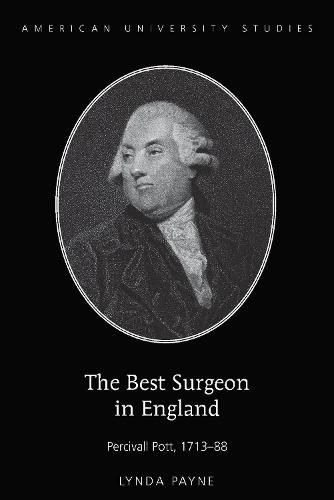Readings Newsletter
Become a Readings Member to make your shopping experience even easier.
Sign in or sign up for free!
You’re not far away from qualifying for FREE standard shipping within Australia
You’ve qualified for FREE standard shipping within Australia
The cart is loading…






This title is printed to order. This book may have been self-published. If so, we cannot guarantee the quality of the content. In the main most books will have gone through the editing process however some may not. We therefore suggest that you be aware of this before ordering this book. If in doubt check either the author or publisher’s details as we are unable to accept any returns unless they are faulty. Please contact us if you have any questions.
Percivall Pott (1713-88) was a leading surgeon in eighteenth-century Britain. This work mines the rich biographical and bibliographical record Pott and his students left behind to add to the historical and intellectual understanding of pre-modern surgery. This was a time when surgery was becoming professionalized. Pott maintained a significant role in crafting the image of a professional surgeon as someone who is capable of treating a multitude of poor hospital patients while at the same time effectively teaching operative skills and manners to the next generation of young men and running a successful and wealth-producing private practice.
Pott had more medical conditions named after him during his lifetime than any other surgeon of his era or since; analyzing what conditions surgeons claimed were theirs to manage and what ailments patients sought surgical solutions for reveals the importance and power of rhetoric in crafting the increasingly rigid definition of medicine as a sophisticated scientific activity rather than a mundane lay experience of treating sickness. The practice of naming conditions after surgeons also helps lay bare the power to classify and own certain sites in the body.
An account of Pott’s life and work challenges the prevailing view in historiographical works of surgery before the era of general anesthesia as a realm of screaming patients and larger than life eccentric medical men whose primary aims were to operate as fast as possible. Through an examination of the life and work of the man rated the best surgeon in England by his contemporaries, the whole field of surgery in history becomes humanized.
$9.00 standard shipping within Australia
FREE standard shipping within Australia for orders over $100.00
Express & International shipping calculated at checkout
This title is printed to order. This book may have been self-published. If so, we cannot guarantee the quality of the content. In the main most books will have gone through the editing process however some may not. We therefore suggest that you be aware of this before ordering this book. If in doubt check either the author or publisher’s details as we are unable to accept any returns unless they are faulty. Please contact us if you have any questions.
Percivall Pott (1713-88) was a leading surgeon in eighteenth-century Britain. This work mines the rich biographical and bibliographical record Pott and his students left behind to add to the historical and intellectual understanding of pre-modern surgery. This was a time when surgery was becoming professionalized. Pott maintained a significant role in crafting the image of a professional surgeon as someone who is capable of treating a multitude of poor hospital patients while at the same time effectively teaching operative skills and manners to the next generation of young men and running a successful and wealth-producing private practice.
Pott had more medical conditions named after him during his lifetime than any other surgeon of his era or since; analyzing what conditions surgeons claimed were theirs to manage and what ailments patients sought surgical solutions for reveals the importance and power of rhetoric in crafting the increasingly rigid definition of medicine as a sophisticated scientific activity rather than a mundane lay experience of treating sickness. The practice of naming conditions after surgeons also helps lay bare the power to classify and own certain sites in the body.
An account of Pott’s life and work challenges the prevailing view in historiographical works of surgery before the era of general anesthesia as a realm of screaming patients and larger than life eccentric medical men whose primary aims were to operate as fast as possible. Through an examination of the life and work of the man rated the best surgeon in England by his contemporaries, the whole field of surgery in history becomes humanized.